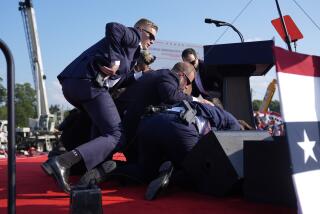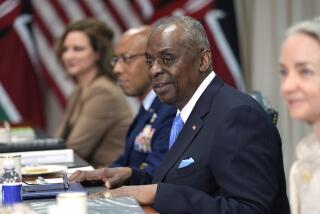White House Won’t Switch President’s Power to Bush During Surgery
- Share via
WASHINGTON — The White House decided Friday against temporarily transferring President Reagan’s powers to Vice President George Bush during the three-hour intestinal surgery the President will undergo this afternoon.
“The President is in good spirits and equipped to handle whatever comes his way,” White House spokesman Larry Speakes said.
The 25th Amendment to the Constitution, which was not invoked when Reagan was shot in an assassination attempt March 30, 1981, provides for the legal mechanism under which the vice president can stand in temporarily for the President.
Sense of Crisis
But simply putting the 18-year-old amendment into effect for the first time could create a sense of crisis.
In keeping with efforts to portray the 74-year-old President’s medical condition--and its impact on his ability to run the government--as under control, Speakes told reporters: “We are prepared for any contingency. Whatever needs to be done we will do.”
After Reagan was shot four years ago, White House officials and others were critical of the confusion characterized by the remark of then-Secretary of State Alexander M. Haig Jr. to reporters: “As of now, I am in control at the White House pending the return of the vice president.” Bush, at the time, was hurrying back to Washington from Texas.
Orderly Transfer
The constitutional amendment is intended to provide for the orderly and temporary transfer of the President’s power to the vice president.
It offers two methods:
--The President can send to the Speaker of the House, Democratic Rep. Thomas P. (Tip) O’Neill Jr. of Massachusetts, and to the president pro tem of the Senate, Republican Sen. Strom Thurmond of South Carolina, “his written declaration that he is unable to discharge the powers and duties of his office.”
--Or, if the President is unable or unwilling to tell Congress of his disability, the vice president can inform Congress of the President’s condition. But the vice president must obtain the agreement of the majority of the President’s Cabinet or “of such other body as Congress may provide.”
Under a temporary transfer, the vice president would carry out the President’s responsibilities until the President was again able to assume the tasks of his office.
The amendment was prompted by the assassination of President John F. Kennedy in 1963, which focused attention on the problems that would be raised by an incapacitated President.
Eisenhower Heart Attack
There have been repeated instances of presidential incapacitation. For example, President Dwight D. Eisenhower’s 1955 heart attack created a period of uncertainty for the country, and Vice President Richard M. Nixon was concerned that he might be criticized for assuming too much responsibility.
While Reagan is undergoing surgery at Bethesda Naval Medical Center in suburban Maryland, Bush is expected to remain at his family’s seaside vacation home in Kennebunkport, Me. He was scheduled to drive to Maine Friday night after attending a Republican Party fund-raising dinner in Boston and had no plans to return to Washington before Sunday evening.
“He will be on private time all weekend,” said Shirley Green, Bush’s deputy press secretary. “He feels very confident that the President’s condition is such that the situation is all right.”
Officials have asserted that the President or vice president can carry out his duties and remain in full communication with military authorities and advisers from virtually anyplace on the globe.
More to Read
Get the L.A. Times Politics newsletter
Deeply reported insights into legislation, politics and policy from Sacramento, Washington and beyond. In your inbox twice per week.
You may occasionally receive promotional content from the Los Angeles Times.








